|
|
|
Sort Order |
|
|
|
Items / Page
|
|
|
|
|
|
|
| Srl | Item |
| 1 |
ID:
118239


|
|
|
|
|
| Publication |
2012.
|
| Summary/Abstract |
The election of Barack Obama as President of the United States in November 2008 was an electric moment for the whole world, a shock in the course of history. The world's most powerful democracy had chosen a black man from a humble background, grandson of a Kenyan peasant who had risen to be a cook in the British Army. It was a truly amazing reaffirmation of the equal opportunity for all that is the stuff of the American dream. Shirley Williams examines the upcoming election and the players.
|
|
|
|
|
|
|
|
|
|
|
|
|
|
|
|
| 2 |
ID:
118225
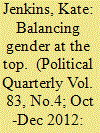

|
|
|
| 3 |
ID:
118241
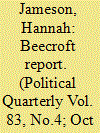

|
|
|
|
|
| Publication |
2012.
|
| Summary/Abstract |
The Coalition government made a commitment to review employment law to ensure flexibility for both parties and enhance business's competitiveness. This led the prime minister to ask venture capitalist Adrian Beecroft to undertake the task of identifying the areas of employment law that presented the greatest burden, and making recommendations for reform. The Beecroft report identifies 16 areas for reform, but the lack of evidence to support his conclusions severely undermines his case. The challenge of increasing employment in a stagnant economy is substantial, and Beecroft's recommendations, if implemented, are unlikely to make a difference. Businesses need to see increased demand and access to finance if they are to take on more workers, but government must also develop a long-term vision of the UK labour market and address weaknesses that existed before the financial crisis.
|
|
|
|
|
|
|
|
|
|
|
|
|
|
|
|
| 4 |
ID:
118231


|
|
|
|
|
| Publication |
2012.
|
| Summary/Abstract |
In this article I argue that there is a significant generational shift within British Pakistani communities in relation to political participation and civic engagement. Using George Galloway's March 2012 by-election victory in Bradford West and an analysis of primary empirical research conducted amongst British Pakistani communities between 2005-2007, and, 2011, I argue that kinship-based bloc voting-a feature of British Pakistani political engagement in UK politics-is being challenged. A younger generation of British Pakistanis want politicians to engage with them as individuals rather than politicians assuming their votes through co-opting Pakistani community elders in a system of patronage politics, an arrangement which has been in place since mass immigration from the subcontinent in the 1950s and 60s.
|
|
|
|
|
|
|
|
|
|
|
|
|
|
|
|
| 5 |
ID:
118218


|
|
|
|
|
| Publication |
2012.
|
| Summary/Abstract |
Running through Bernard Crick's In Defence of Politics is an implicit faith in the ability of liberal democracy to deliver progress. From the perspective of 1962 such optimism seems well founded. After the years of post war austerity there had been more than a decade of steady growth, the middle class was expanding fast providing unprecedented levels of absolute social mobility (more benign and less complicated than the relative social mobility which today's politicians disingenuously claim to pursue). Matthew Taylor explores the case for 'social politics'.
|
|
|
|
|
|
|
|
|
|
|
|
|
|
|
|
| 6 |
ID:
118240
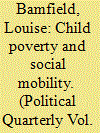

|
|
|
|
|
| Publication |
2012.
|
| Summary/Abstract |
Reviewing two of the latest reports by social mobility tsar, Alan Milburn and 'social justice' champion, Iain Duncan Smith, the article examines the politics and policy of the Coalition's fairness strategy and the jostling for position that is going on behind the scenes. Whilst continuing to pay lip service to the goal of ending child poverty, the government is seeking to redefine the problem, away from a narrow focus on relative low income. Beneath the rhetoric, the article highlights the close similarities between the 'new' and 'old' approaches, finding that the evidence behind the government's claims is unconvincing. Far from offering a 'step-change' in provision, it concludes that in the new age of austerity the Coalition will struggle to make any positive progress on tackling poverty and improving the relative life chances of disadvantaged children.
|
|
|
|
|
|
|
|
|
|
|
|
|
|
|
|
| 7 |
ID:
118224


|
|
|
|
|
| Publication |
2012.
|
| Summary/Abstract |
Prior to the election in 2010 David Cameron pledged that his first cabinet would comprise one-third women and would be the most family friendly ever. Since forming the Coalition Government, he appears to have a 'problem' with women. We argue that this problem stems from: the weak representation of women in cabinet and across government; the diminishing resources available to government actors to support gender equality policy; and women's exclusion from the key Coalition networks, both formal and informal, that determine government policy.
|
|
|
|
|
|
|
|
|
|
|
|
|
|
|
|
| 8 |
ID:
118216
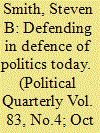

|
|
|
|
|
| Publication |
2012.
|
| Summary/Abstract |
What are the threats to politics fifty years after the publication of Bernard Crick's classic In Defence of Politics? The chief danger lies in the forces of globalisation and the eclipse of the national state as the locus of political life. It is the hope of many in both Europe and the US that we might replace the basic structure of the sovereign state with a variety of postnational forms of organisation such as the UN or the EU. What are the forces behind these developments? Are we entering a world beyond politics increasingly administered by international law courts and tribunals no longer responsible to their national electorates? The possibility cannot be ruled out, but such a world, I suggest, would no longer be a political world.
|
|
|
|
|
|
|
|
|
|
|
|
|
|
|
|
| 9 |
ID:
118232


|
|
|
|
|
| Publication |
2012.
|
| Summary/Abstract |
The financial crisis which began in 2007 has been widely interpreted as a crisis of neoliberalism, akin to the crisis of Keynesianism of the 1970s. But there is little sign of a major paradigmatic alternative, either in theory or in practice. This article looks at how the crises and failures of neoliberalism are occurring at a micro-policy level, where they are interpreted in terms of the fallibility of individual rational choice. Policy responses to this crisis, drawing on more psychologically nuanced accounts of economic behaviour, can be described as 'neocommunitarian', inasmuch as they echo the communitarian critique of the liberal self. Where neoliberalism rests on a vision of the individual as atomised and rational, neocommunitarianism treats individuals as governed by social norms and incentives simultaneously. And where neoliberalism subjects individuals to periodic audit organised around targets and outputs, neocommunitarianism conducts a constant audit of behavioural fluctuations in real time.
|
|
|
|
|
|
|
|
|
|
|
|
|
|
|
|
| 10 |
ID:
118222


|
|
|
| 11 |
ID:
118223
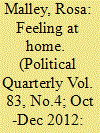

|
|
|
| 12 |
ID:
118220
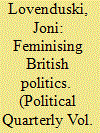

|
|
|
| 13 |
ID:
118226
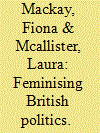

|
|
|
|
|
| Publication |
2012.
|
| Summary/Abstract |
Modest levels of female representation at the House of Commons are in sharp contrast to the Nordic-levels of representation achieved in the Scottish Parliament and the National Assembly for Wales since devolution in 1999. One apparent advantage of devolution is the opportunity that it provides for lesson-learning across jurisdictions. This article offers six lessons on women's political representation-three positive and three negative-drawn from the experience of devolution in Scotland and Wales. We draw conclusions from these lessons, including the need to keep parties under scrutiny to ensure they deliver on their rhetorical commitments. We also postulate that gender equality might prove too important to be left to political parties and consider whether there is a need to consider stronger measures such as mandatory quotas.
|
|
|
|
|
|
|
|
|
|
|
|
|
|
|
|
| 14 |
ID:
118214


|
|
|
|
|
| Publication |
2012.
|
| Summary/Abstract |
Intimately throughout the 1970s, and in a more detached way for the rest of his life, Bernard Crick thought seriously about the politics of Northern Ireland. Though he produced no systematic study of the Northern Ireland Question, and though at first glance Northern Ireland appeared to be unpropitious territory for the author of In Defence of Politics, his reflections illuminated a deep concern with the relationship between politics, freedom and peace. This article argues that Crick's writing on the subject constitutes a sustained appeal for a 'realism of pragmatic potential' in contrast to that despairing 'realism of impossible certainty' which, he felt, frustrated hopes for political progress.
|
|
|
|
|
|
|
|
|
|
|
|
|
|
|
|
| 15 |
ID:
118227
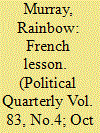

|
|
|
|
|
| Publication |
2012.
|
| Summary/Abstract |
France and the UK both have parliaments with one MP per constituency. This electoral system is known not to be conducive to women's representation, and both countries have struggled with low proportions of women in parliament. France's response was to introduce a gender parity law in 2000. Since then, the number of women in the French parliament has almost doubled, but still remains low by European standards and is far from parity. This article considers what the UK can learn from the French experience. In particular, it considers how gender quotas emerged onto the agenda in France, why they were set at 50% and how effective this was, how they were implemented, and why they have not been more successful. The article does not recommend following in France's footsteps, but the UK can take inspiration from France's successes and seek to avoid repeating her mistakes.
|
|
|
|
|
|
|
|
|
|
|
|
|
|
|
|
| 16 |
ID:
118234
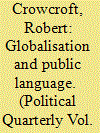

|
|
|
|
|
| Publication |
2012.
|
| Summary/Abstract |
This article questions what the concept of 'globalisation' really amounts to. In doing so it highlights problems for the ascendancy of globalisation in contemporary public debate. Globalisation has become a catch-all; the phrase is now used to try and explain all manner of phenomena from everyday life to international politics. But the article suggests that this may be little more than a combination of rhetoric and wishful thinking. It asserts that the contemporary world is being driven by older and familiar pressures, such as state power and nationalism. As a result, the idea of 'globalisation' needs to be treated with some scepticism.
|
|
|
|
|
|
|
|
|
|
|
|
|
|
|
|
| 17 |
ID:
118235


|
|
|
|
|
| Publication |
2012.
|
| Summary/Abstract |
In the last decade the role of the Prime Minister in the process for making senior Church appointments has changed significantly. The man who replaces Dr Rowan Williams-and it will be a man-will be appointed through a procedure in which the Prime Minister is expected to enjoy no choice but to simply confirm the Church of England's preferred candidate. The aim of this article is to draw upon fresh empirical research in order to explore why and how the politics and governance of ecclesiastical patronage has been recalibrated in this way. More importantly this article seeks to embed the study of ecclesiastical patronage within a much broader appreciation of how other forms of ministerial patronage have also become tightly constrained. This, in itself, forges a connection between the role of politicians in senior Church appointments, on the one hand, and a much richer and broader seam of research and writing that poses distinct questions about the nature of modern governance, the benefits of depoliticisation, the accountability of appointment commissions, the capacity of politicians and the future of democracy.
|
|
|
|
|
|
|
|
|
|
|
|
|
|
|
|
| 18 |
ID:
118236


|
|
|
|
|
| Publication |
2012.
|
| Summary/Abstract |
One of the most exciting innovations within 'practical democratic theory' in recent years has been the emergence of deliberative democracy, as a theoretically refined ideal with by now some well-honed mechanisms for its implementation on a small scale. Its greatest remaining challenge is to figure out some way to connect those highly controlled, small-scale deliberative exercises to the 'main game', politically. I sketch some limited and indirect ways in which that might happen in national politics, before going on to propose a more novel way in which such deliberative events might be used literally to make international law of a certain sort.
|
|
|
|
|
|
|
|
|
|
|
|
|
|
|
|
| 19 |
ID:
118217
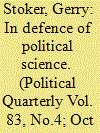

|
|
|
|
|
| Publication |
2012.
|
| Summary/Abstract |
The defence of political science rests on a starting proposition that practitioners of political science need to embrace relevance rather than fear. Defending the role of politics in resolving societal dilemmas is in part a responsibility of those who study it and the challenge is significant given evidence of disenchantment with the political process in many established and mew democracies. Political science needs to offer not only an understanding of politics that is theoretical, sophisticated and empirically rigorous but also an approach that is not just problem-focused but solution-seeking. Defending political science means defending politics and taking on the challenge of improving its practice.
|
|
|
|
|
|
|
|
|
|
|
|
|
|
|
|
| 20 |
ID:
118211


|
|
|
|
|
| Publication |
2012.
|
| Summary/Abstract |
In a world that is increasingly dominated by literary hyperbole there can be no doubt that Bernard Crick's In Defence of Politics remains a classic text. Classic not just in the sense that it provides a masterly account of the essence, meaning and fragility of democratic politics but classic in the sense that it is written with a style, verve and passion that is rarely found within political science. If the test of pretensions to 'a classic' status is that a book defies the passage of time in terms of significance and argument then Crick's Defence would also make the grade for the simple fact that its arguments remain arguably far more important today than they were when they were first published exactly fifty years ago. This article reflects on the contemporary significance of Crick's Defence by defending politics against an updated set of adversaries in the form of: public expectations, marketisation, depoliticisation, the media, and crises before locating the book within the contours of current debates about public disengagement, the rise of 'disaffected democrats' and questions concerning the future and relevance of political science.
|
|
|
|
|
|
|
|
|
|
|
|
|
|
|
|
|
|
|
|
|